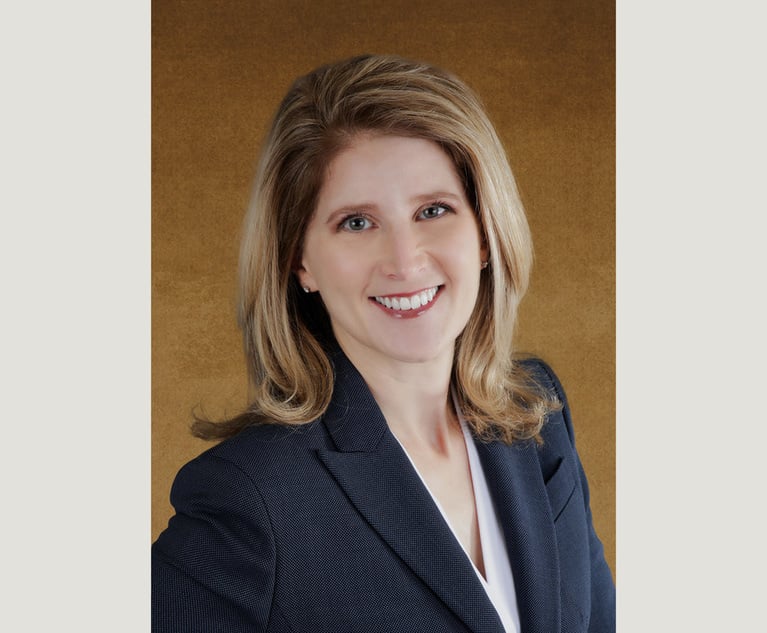 Luke T. Weber of Barley Snyder. Courtesy photo
Luke T. Weber of Barley Snyder. Courtesy photo Jury Instruction Dilemma: SSJI 14.90's Conflict With Shifting Pennsylvania Law
What happens when the law changes and the standard charge is wrong? Since 2021, Pennsylvania Suggested Standard Civil Jury Instruction Number 14.90 "Informed Consent-Nondisclosure" has been in direct conflict with Pennsylvania law.
April 22, 2024 at 12:19 PM
8 minute read
Special Sections"I'm going to give the standard charge." As medical malpractice attorneys we are used to hearing this common refrain from the court. Whether explicit or implied, the court may often express the adage that "no one has ever been reversed giving the standard instruction." But what happens when the law changes and the standard charge is wrong? Since 2021, Pennsylvania Suggested Standard Civil Jury Instruction Number 14.90 "Informed Consent-Nondisclosure" has been in direct conflict with Pennsylvania law.
In 2021, Section 504(b) of the MCARE Act was amended to address and abrogate the Pennsylvania Supreme Court's holding in Shinal v. Toms, 162 A.3d 429 (Pa. 2017). In Shinal, the high court held that a physician had a nondelegable duty to personally obtain informed consent from a patient. This meant that only the physician providing the care at issue could obtain informed consent, and pre-operative communications between other members of the medical team and the patient were legally insufficient and irrelevant. The decision imposed a regime that conflicted with common medical practices. Both the American Medical Association and the Pennsylvania Medical Society filed amicus briefs unsuccessfully arguing that the informed consent process may include the involvement of colleagues and other qualified staff acting on behalf of a surgeon.
This content has been archived. It is available through our partners, LexisNexis® and Bloomberg Law.
To view this content, please continue to their sites.
Not a Lexis Subscriber?
Subscribe Now
Not a Bloomberg Law Subscriber?
Subscribe Now
NOT FOR REPRINT
© 2025 ALM Global, LLC, All Rights Reserved. Request academic re-use from www.copyright.com. All other uses, submit a request to [email protected]. For more information visit Asset & Logo Licensing.
You Might Like
View All
Pa. Supreme Court to Decide Enforceability of 'Browsewrap' Arbitration Agreements
8 minute read
From a Mediator’s Perspective: Common Mis-steps That Parties Make at Mediation
6 minute readTrending Stories
- 1The Rise and Risks of Merchant Cash Advance Debt Relief Companies
- 2Ill. Class Action Claims Cannabis Companies Sell Products with Excessive THC Content
- 3Suboxone MDL Mostly Survives Initial Preemption Challenge
- 4Paul Hastings Hires Music Industry Practice Chair From Willkie in Los Angeles
- 5Global Software Firm Trying to Jump-Start Growth Hands CLO Post to 3-Time Legal Chief
Who Got The Work
J. Brugh Lower of Gibbons has entered an appearance for industrial equipment supplier Devco Corporation in a pending trademark infringement lawsuit. The suit, accusing the defendant of selling knock-off Graco products, was filed Dec. 18 in New Jersey District Court by Rivkin Radler on behalf of Graco Inc. and Graco Minnesota. The case, assigned to U.S. District Judge Zahid N. Quraishi, is 3:24-cv-11294, Graco Inc. et al v. Devco Corporation.
Who Got The Work
Rebecca Maller-Stein and Kent A. Yalowitz of Arnold & Porter Kaye Scholer have entered their appearances for Hanaco Venture Capital and its executives, Lior Prosor and David Frankel, in a pending securities lawsuit. The action, filed on Dec. 24 in New York Southern District Court by Zell, Aron & Co. on behalf of Goldeneye Advisors, accuses the defendants of negligently and fraudulently managing the plaintiff's $1 million investment. The case, assigned to U.S. District Judge Vernon S. Broderick, is 1:24-cv-09918, Goldeneye Advisors, LLC v. Hanaco Venture Capital, Ltd. et al.
Who Got The Work
Attorneys from A&O Shearman has stepped in as defense counsel for Toronto-Dominion Bank and other defendants in a pending securities class action. The suit, filed Dec. 11 in New York Southern District Court by Bleichmar Fonti & Auld, accuses the defendants of concealing the bank's 'pervasive' deficiencies in regards to its compliance with the Bank Secrecy Act and the quality of its anti-money laundering controls. The case, assigned to U.S. District Judge Arun Subramanian, is 1:24-cv-09445, Gonzalez v. The Toronto-Dominion Bank et al.
Who Got The Work
Crown Castle International, a Pennsylvania company providing shared communications infrastructure, has turned to Luke D. Wolf of Gordon Rees Scully Mansukhani to fend off a pending breach-of-contract lawsuit. The court action, filed Nov. 25 in Michigan Eastern District Court by Hooper Hathaway PC on behalf of The Town Residences LLC, accuses Crown Castle of failing to transfer approximately $30,000 in utility payments from T-Mobile in breach of a roof-top lease and assignment agreement. The case, assigned to U.S. District Judge Susan K. Declercq, is 2:24-cv-13131, The Town Residences LLC v. T-Mobile US, Inc. et al.
Who Got The Work
Wilfred P. Coronato and Daniel M. Schwartz of McCarter & English have stepped in as defense counsel to Electrolux Home Products Inc. in a pending product liability lawsuit. The court action, filed Nov. 26 in New York Eastern District Court by Poulos Lopiccolo PC and Nagel Rice LLP on behalf of David Stern, alleges that the defendant's refrigerators’ drawers and shelving repeatedly break and fall apart within months after purchase. The case, assigned to U.S. District Judge Joan M. Azrack, is 2:24-cv-08204, Stern v. Electrolux Home Products, Inc.
Featured Firms
Law Offices of Gary Martin Hays & Associates, P.C.
(470) 294-1674
Law Offices of Mark E. Salomone
(857) 444-6468
Smith & Hassler
(713) 739-1250







